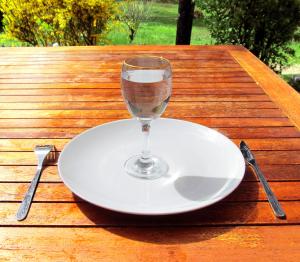Consume this, consume that. Consume. Consume all you want. And then consume some more for extra measure. Take. Take this, take that, take all you want and then some more. Eat. Eat this, eat that, eat all you want, and then eat some more.
The more we have, the more we want. The more we want the more we feel we should be able to take, no matter the consequences of our actions. The more we take, the greater we think of ourselves, the more fulfilled we believe ourselves to be. Thus, we grow in our view of ourselves in relation to what we possess. What we take in from the world around us and make it our own becomes a part of who and what we think we are; our conception of who and what we think we are is an imputed conception which combines several different elements together. The more we can add from what is outside of ourselves to ourselves, the greater our notion of the self grows, but also, the further away we move from knowing and understanding our true nature. We construct a false notion of the self and become attached to it, acting, therefore, in relation to that false self, trying to hold onto and reinforce that self which does not really exist.
In creating that false self, we construct with it a false duality between that self and the rest of the world. Instinct and intuition tells us that duality is false, but instead of focusing upon the way it is established through the establishing of a self which is set up and opposed to the rest of the world, we tend to reify that self and to try to make it greater, to make it grow, overcoming that false-dualism between the self and the world by assimilating what we assume to be in the world opposed to the self into the self itself. We try to lessen and overcome the distinction by removing the “not-we” from existence, so that if the process is allowed to continue, the goal would be to overcome the duality by making ourselves the one lord over all things, the one self in which all things exist.
We want to view all things in ourselves, to be possessed by us, to become us. Consumerism reinforces this by suggesting this is all good, that this is the way towards self-fulfillment; we must not only accept ourselves as we believe ourselves to be, we must increase and make everything else decrease. It encourages this by promoting the consumption of the world into ourselves. It thrives off of our desire. It reminds us that the world outside of ourselves is doing the same thing, and so we must protect ourselves from being consumed. We must reinforce ourselves from the not-we. To do this, we must make everything ours. Everything else will be doing the same. We will find elements of ourselves consumed by the not-we; the goal is to take the not-we into ourselves faster than the not-we consumes us. Then slowly we will override the not-we and stop it from consuming ourselves. Finally, we shall reach the goal of bridging the duality of the world by making only ourselves all that is. Until we do so, the not-we is there for us as an object of consumption. The more we take of the not-we and turn it into ourselves, the greater we think ourselves to be, which in turn, means we are that much more worthy of becoming the one single lord over all things.
We find this becomes easier and easier to do the more we take and destroy that which is the not-we. Our ego grows. But instead of being more and more satisfied, we find our desire, our thirst, our hunger grows in proportion to our ego. The more we take, the less that which we take unto ourselves satisfies, and the more we must take in order to attain a moment of pleasure before we once again feel the hunger for consumption taking over us again.
Such boundless consumption and destruction of the other never satisfies, but must of us know no other way to engage the world. It becomes habitual. We let our passion for consumption rule over us. We become a slave to our desires; so long as we give in to them, we find ourselves taking from the not-we but never satisfied, growing in attachment to the self but never in serenity. Even when we begin to realize this cycle of consumption does not truly give what we desire, we know nothing else. It has become habitual. We have entered into an apparently never-ending cycle of desire. We consume, we have a moment of satisfaction (with less and less satisfaction in relation to the same level of consumption); then when that moment has come and gone, we find ourselves once again suffering with an existential angst, with dissatisfaction if not outright suffering, which leads us to desire to consume some more in order to overturn our malaise. Unless we find a way to overturn this bad habit, it will become ever-ending, as the not-we which is outside of ourselves is never-ending. Not only will our consumption end up not satisfying us, it actually becomes a part of the development of our own dissatisfaction. We thirst and hunger for the not-we, to take it and become lord over it, but in reality, all we do is make that thirst and hunger grow without limit, and so with it, the suffering which results after the momentary satisfaction grows, intensifies, and indeed, becomes more the center of our being as we try to do anything which we think will make that pain go away.
There remains, behind the habit, behind the assertion of a false sense of self, a truth which must be recognized. The duality which we establish between ourselves and the world, the individualization which we establish for ourselves which cuts us from the rest of creation, remains at the core, a foundation for our suffering. We want to solve it, but we solve it by reifying the problem, reinforcing that false self which divides itself from the rest of the world. We must recognize that imputation, that concept of ourselves which we try to reinforce is at the heart of the problem; we can theoretically recognize this true, but we also must put it into practice, and realize the truth from experience. We must let go of the self, overturning the desires which lead for its reification; we must overcome the will to consume. Then we can slowly see that false self decline, until at last, it vanishes and the interdependent relationship and communion which exists on the level of being is realized, leading us to see and understand our true interdependent existence as relational persons in communion with the rest of creation.
This is why fasting can be, and is, an important tool. It helps us overturn our bad habit of trying to consume the word and turn it into ourselves. It helps us detach ourselves from the dualistic engagement with the world; it teaches us to stop trying to take over and control the world by becoming a god over it. Because we have engaged such egotistical grasping from our infancy, this is going to be difficult. It goes against the norm which we have set up for ourselves. It tells us that the way which we exist in the world and interact with it is wrong. We do not need to consume and take over the world. We do not need to turn our self into the master of the world.
This is why some spiritual masters, looking to the myth of Adam and Eve in Genesis, suggest gluttony is at the root of human evil and original sin. To become like god, to seek to be like god, is to take to lord it over the earth. Adam took and eat the fruit of the tree of knowledge of good and evil to take control and dominate the world, elevating himself and his imputed notion of lordship, so that he thought he could deliberate in relation to that self, what is good and evil.
If gluttony (and other forms of objectifying the world for the sake of similar lordship, such as lust and avarice), promote the false dualism of subject-object duality that leads to the desire to reify the subject at the expense of the object, then to overcome this duality, we must let the false self recede. Fasting counteracts the desires of glutton, laying in and establishing wholesome habits which counter the turn to the self which gluttony has reinforced. Instead of giving in to the cycle of consumption, we overturn it by establishing a habit of self-detachment; slowly our false-self grows thin, our desires become less, and our satisfaction and peace grows. Fasting allows us to bring to a halt our self-assertion in the world. Slowly, as the self vanishes, we begin to see beyond it, to see what it has veiled from us, and so we begin to truly see the truth of the path of salvation which leads to true and everlasting beatitude. Fasting helps us to come to know who we are, to find peace in who we really are, to realize we don’t need to consume the other to find the peace which we desire. Indeed, through fasting, we begin to overturn the bad habits of the self which we have long accepted and followed; through fasting, we begin the process of overcoming the addiction to the self which holds us down.
Of course, we must follow with the spirit of fasting, to take its lessons and follow them through if we want our fasting to be for our own good. We must overturn our desire to consume, but more than that, we must overturn the subsequent desires and emotions which have come from it. Fasting without the spirit of charity, without the spirit of love, will only go so far, before we let pride take over and turn fasting against itself and as another means by which our false sense of self can increase. Fasting must always be engaged with charity, with love, for it to truly nurture us and help us achieve our desired end, a communion of being. For truly, what will bring us peace is union with the rest of being in God, a union which is not t a monistic union, where we either absorb the rest of being into ourselves, or we allow ourselves to be nihilistically absorbed and lose ourselves by denying our relative personal relations with the rest of being, but one where we are united in a communion of love, allowing the interdependent relationship to be bonded together by the chains of love which keep all things together without annihilating any of it in the process.
[Image= Fasting – A glass of water in an empty plate by Jean Fortunet (Own work) [CC BY 1.0 (http://creativecommons.org/licenses/by/1.0)], via Wikimedia Commons]
Stay in touch! Like A Little Bit of Nothing on Facebook














